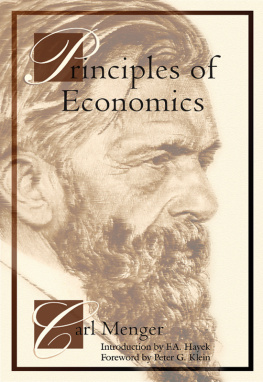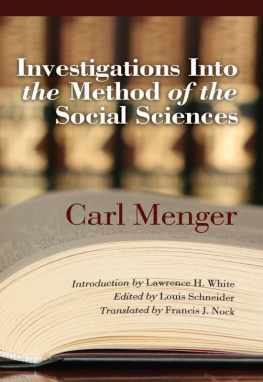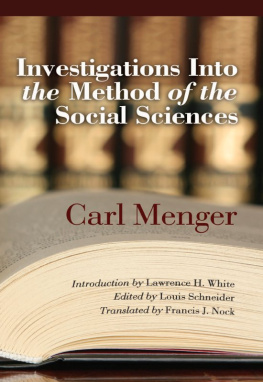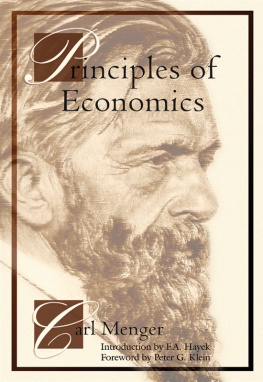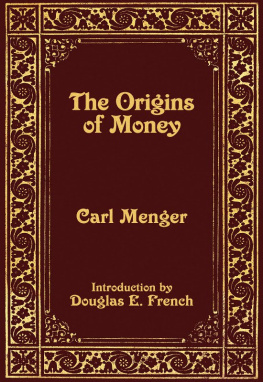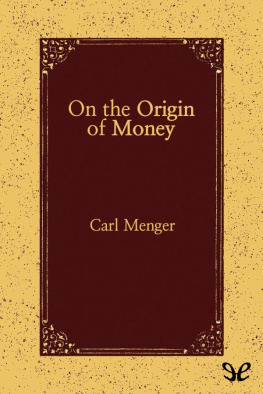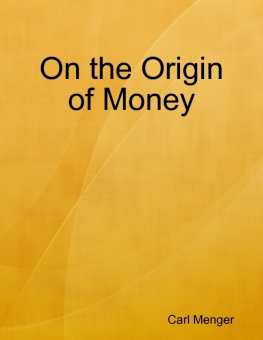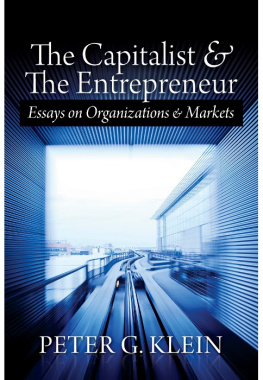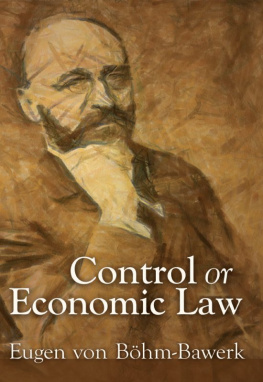Carl Menger - Principles of Economics - Pocket Edition
Here you can read online Carl Menger - Principles of Economics - Pocket Edition full text of the book (entire story) in english for free. Download pdf and epub, get meaning, cover and reviews about this ebook. year: 2011, publisher: Ludwig von Mises Institute, genre: Science. Description of the work, (preface) as well as reviews are available. Best literature library LitArk.com created for fans of good reading and offers a wide selection of genres:
Romance novel
Science fiction
Adventure
Detective
Science
History
Home and family
Prose
Art
Politics
Computer
Non-fiction
Religion
Business
Children
Humor
Choose a favorite category and find really read worthwhile books. Enjoy immersion in the world of imagination, feel the emotions of the characters or learn something new for yourself, make an fascinating discovery.
- Book:Principles of Economics - Pocket Edition
- Author:
- Publisher:Ludwig von Mises Institute
- Genre:
- Year:2011
- Rating:4 / 5
- Favourites:Add to favourites
- Your mark:
Principles of Economics - Pocket Edition: summary, description and annotation
We offer to read an annotation, description, summary or preface (depends on what the author of the book "Principles of Economics - Pocket Edition" wrote himself). If you haven't found the necessary information about the book — write in the comments, we will try to find it.
In the beginning, there was Menger. It was this book that reformulated, and really rescued, economic science. It kicked off the Marginalist Revolution, which corrected theoretical errors of the old classical school. These errors concerned value theory, and they had sown enough confusion to make the dangerous ideology of Marxism seem more plausible than it really was.
Menger set out to elucidate the precise nature of economic value, and root economics firmly in the real-world actions of individual human beings.
For this reason, Carl Menger (1840-1921) was the founder of the Austrian School of economics. It is the book that Mises said turned him into a real economist. Whats striking is how nearly a century and a half later, the book still retains its incredible power, both in its prose and its relentless logic.
The Mises Institutes new edition features a new foreword by Peter G. Klein, which summarizes Mengers contribution and places him in the history of ideas. He also explains his continued relevance.
Economics students still say that it is the best introduction to economic logic ever written. The book also deserves the status of a seminal contribution to science in general. Truly, no one can claim to be well read in economics without having mastered Mengers argument.
Menger advances his theory that the marginal utility of goods is the source of their value, not the labor inputs that went into making them. The implication is that the individual mind is the source of economic value, a point which started a revolution away from the flawed classical view of economics.
Menger also covers property, price, time, production, and wealth. On money, for example, it was Menger who so beautifully explained how it originates not in social contract or legislation but within the framework of the market economy.
Table of Contents
Foreword by Peter G. Klein
Introduction by F.A. Hayek
Translators Preface
Authors Preface
I. The General Theory of the Good
- The Nature of Goods
- The Causal Connections Between Goods
- The Laws Governing Goods-character
- Time and Error
- The Causes of Progress in Human Welfare
- Property
II. Economy and Economic Goods
- Human Requirements
- The Available Quantities
- The Origin of Human Economy and Economic Goods
- Wealth
III. The Theory of Value
- The Nature and Origin of Value
- The Original Measure of Value
- The Laws Governing the Value of Goods of Higher Order
IV. The Theory of Exchange
- The Foundations of Economic Exchange
- The Limits of Economic Exchange
V. The Theory of Price
- Price Formation in an Isolated Exchange
- Price Formation Under Monopoly
- Price Formation and the Distribution of Goods under Bilateral Competition
VI. Use Value and Exchange Value
VII. The Theory of the Commodity
- The Concept of the Commodity in its Popular and Scientific Meanings
- The Marketability of Commodities
VIII. The Theory of Money
- The Nature and Origin of Money
- The Kinds of Money Appropriate to Particular Peoples and to Particular Historical Periods
- Money as a Measure of Price and as the Most Economic Form for Storing Exchangeable Wealth
- Coinage
Appendices
- Goods and Relationships
- Wealth
- The Nature of Value
- The Measure of Value
- The Concept of Capital
- Equivalence in Exchange
- Use Value and Exchange Value
- The Commodity Concept
- Designations for Money
- History of Theories of the Origin of Money
Carl Menger: author's other books
Who wrote Principles of Economics - Pocket Edition? Find out the surname, the name of the author of the book and a list of all author's works by series.

